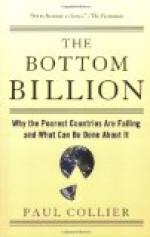When the weather kills yer crop,
Keep a-goin’!
When you tumble from the top,
Keep a-goin’!
S’pose you’re out of every
dime,
Bein’ so ain’t any crime;
Tell the world you’re feelin’
prime—
Keep a-goin’!
When it looks like all is up,
Keep a-goin’!
Drain the sweetness from the cup,
Keep a-goin’!
See the wild birds on the wing,
Hear the bells that sweetly ring,
When you feel like sighin’ sing—
Keep a-goin’!
Frank L. Stanton.
From “The Atlanta Constitution.”
WHEN EARTH’S LAST PICTURE IS PAINTED
What is it that a human being wants? Most of us have something that we like to do more than anything else. We are not free to do it as we wish. We are handicapped by the need to earn a living, by physical weariness, by the carpings and scoffs of the envious, by the limited time we have at our disposal. But underneath all this is the spirit of work—the desire to take up our task for its own sake alone, to give our whole selves to it, to carry it through, not in some partial way, but in accordance with the fulness of our dream. We want to be free from distractions and interruptions; if we are driven at all, we want it to be by our own inner promptings, not by obligation or necessity. Of course these favorable, these ideal conditions belong to heaven, not to earth. Kipling here explains what they will mean to the artist, the painter; but in doing so he expresses the longings of the true workman of whatsoever sort—he sums up the true spirit of work.
When Earth’s last picture is painted
and the tubes are twisted and dried,
When the oldest colors have faded, and
the youngest critic has died,
We shall rest, and, faith, we shall need
it—lie down for an aeon or two,
Till the Master of All Good Workmen shall
set us to work anew.
And those that were good will be happy:
they shall sit in a golden chair;
They shall splash at a ten-league canvas
with brushes of comets’ hair.
They shall find real saints to draw from—Magdalene,
Peter, and Paul;
They shall work for an age at a sitting
and never be tired at all!
And only the Master shall praise us, and
only the Master shall blame;
And no one shall work for money, and no
one shall work for fame,
But each for the joy of the working, and
each, in his separate star,
Shall draw the Thing as he sees It for
the God of Things as They are!
Rudyard Kipling.
From “Rudyard Kipling’s Verse, 1885-1918.”
INDEX BY AUTHORS
A
ADAMS, ST. CLAIR. Born in Arkansas, 1883.
University education; European
travel; has resided at one time or another
in nearly all sections of
America. Miscellaneous literary and
editorial work. A Problem to Be
Solved; Essentials; Good Intentions; It
Won’t Stay Blowed; Jaw; Never
Trouble Trouble; Ownership; The Rectifying
Years; The Syndicated
Smile; Tit for Tat; Wanted—a
Man.




